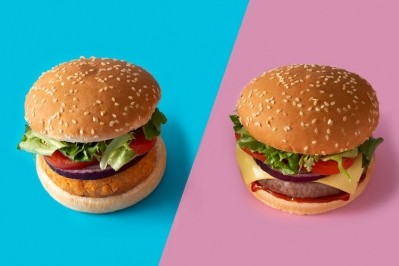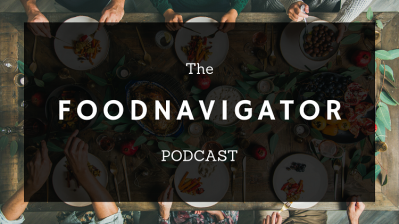‘It’s time to legislate’: EU seafood sector crabby about plant-based ‘fishy’ labelling

Whether plant-based meat and dairy alternatives should use terminology linked to their animal source counterparts (think ‘vegan burger’, ‘plant-based sausage’, or ‘dairy-free cream’) has been hotly debated in recent years.
In some jurisdictions, specific terminology is now banned for plant-based products. Europe’s dairy-free market is case-in-point, where you’ll no longer find ‘milk’, ‘butter’, ‘cheese’ and ‘yoghurt’ for sale in the plant-based aisle.
Meat and dairy alternatives have attracted most of the labelling attention to date, whereas seafood alternatives – which take a smaller share of both plant-based and seafood markets – have largely been off the hook.
But in Brussels last week, the labelling of vegetarian and vegan imitations of fish products was absolutely on the menu: the seafood sector wants tighter regulations for plant-based products.
Transparent labelling to fight fish fraud
On 29 November, the Committee on Fisheries (PECH) held a public hearing to address the regulatory framework surrounding the labelling of plant-based substitutes of fish products and its impacts on the fisheries sector.
As it stands, seafood alternatives can be marketed with ‘fishy’ terminology, such as ‘plant-based salmon’ and ‘vegetarian fish sticks’.
According to PECH, an inadequate regulatory framework risks harming the fisheries sector by misdirecting consumer choices, undermining fair competition, and ‘eroding trust’ in the authenticity of seafood products.

Article 7 of Regulation 1169/2011 states that food information must not mislead and food information must be precise, clear and easily understandable for the consumer.
But plant-based seafood alternatives are misleading consumers, argued Claudia Benassi, marine biologist for Coldiretti Impresapesca National Confederation, who is calling for transparency labelling against seafood fraud.
“Fish products are currently the subject of numerous frauds and imitations by plant-based products which confuse consumers and which risk compromising the competitiveness of the sector.
“There are even reverse frauds, i.e., non-vegan products passed off as such.”
Increasing the transparency of plant-based products would protect seafood producers, who are amongst the most at risk to fraud – ‘both from a health and commercial point of view’.
Coldiretti wants the marketing of all products of animal origin protected at EU-level against ‘misleading’ comparisons and evocations; and that the marketing of imitation plant-based products be ‘fully and unequivocally’ differentiated from that of animal products.
Who is banning 'meaty' or dairy-like terms for plant-based products?
France is mulling a ban on ‘meaty’ names for plant-based products, and its not the only one.
South Africa has also banned ‘meaty’ denominations being used on vegan products, and Turkish legislation now states the term ‘cheese’ cannot be used to describe dairy-free alternatives. Last year, the Turkish government also banned the production of vegan cheese alternatives.
At an EU level, the European Court of Justice implemented a ban on the use of dairy names such as ‘milk’, ‘butter’, ‘cheese’, and ‘yoghurt’ for purely plant-based products (with the exception of coconut milk, peanut butter, almond milk and ice cream) back in 2017.
Three years later, the European Parliament voted against a ban on ‘meaty’ terminology for plant-based alternatives such as ‘burger’, ‘sausage’ or ‘steak’.
‘A plant-based product is not the same as a plant-based diet’
Another reason consumers may be misled by the ‘fishy’ marketing of plant-based market comes down to nutrition, according to seafood stakeholders.
From a nutritional point of view, fish and seafood products do not have alternatives or replacements, stressed Yobana Bermúdez, president of the European Federation of National Organisations of Importers and Exporters of Fish (CEP) and chair of the Market Advisory Council (MAC).
But according to recent findings from NielsenIQ and the Food Industry Association, close to one-third (31%) of consumers in the US purchase seafood alternatives because they believe them to be more nutritious or healthier.
For the CEP president, consumers are confused about the difference between plant-based diets and plant-based products. Although the term ‘plant-based’ is not clearly defined, it does not necessarily mean cutting out meat, poultry, seafood, eggs and dairy from diets, but rather eating more foods from plants and less from animals, he explained. What it does not mean is consuming processed plant-based products instead of conventional alternatives.
It has not been proved that processed plant-based products are healthy, he continued, and are not recommended in ‘any diet’. “A plant-based product is not the same as a plant-based diet.”
But it’s not all about processing. The nutritional credentials of plant-based meat, dairy, and seafood have come under fire for excessive salt and fat content, as well as their often long and confusing ingredients lists.
Tuna is rich in omega 3, vitamins B3 and B12, and contains minerals such as selenium, phosphorus and zinc. Ingredients on a can of brined tuna are likely to include tuna, water, salt and natural flavours.
At the hearing, Roberto C. Alonso Baptista de Sousa, secretary general of the Spanish Association of Canned Fish Manufacturers, president of Eurothon, and VP of APICE, took issue with Nestlé-owned Garden Gourmet’s plant-based tuna brand ‘Vuna’, which is significantly more calorie-dense (279kcal compared to 68kcal per 100g) and contains 20% fat compared to less-than-1% in brined tuna. Further, the ingredients list is undoubtedly longer: water, pea protein, rapeseed oil, wheat gluten, flavourings, citric fibres and salt.
For plant-based seafood makers, health and nutrition is on the agenda. The recently launched alternative seafood association, Future Ocean Foods, wants to raise the nutritional profile of the category, with particular emphasis on protein and omegas.
CEP’s Bermúdez recommends that moving forward, the nutritional credentials of plant-based fish alternatives be taken into account, including the main ingredients and production methods used to imitate the texture, sensorial properties, appearance, and flavour of fisheries and aquaculture products.
The dietary and health impacts of the replacement of fisheries and aquaculture proteins for plant-based products, ‘particularly highly processed ones’, should also be considered, he told the hearing.
Nestlé vegan tuna brand in the spotlight: are consumers confused?
In marketing vegan seafood products in a similar way to their conventional counterparts, plant-based manufacturers have been accused of providing misleading food information.
Garden Gourmet’s ‘Vuna’ is one such product to have been criticised by the secretary general of the Spanish association of canned fish manufacturers, Baptista de Sousa.
From a terminology perspective, the product claims it ‘tastes like tuna’ and contains ‘no fish’. The product’s textural appearance is suggestive of tuna, and its packaging (in a glass twist-top jar) is similar to that of other tuna products. It evocates canned tuna, stressed the secretary general.
“For fish, it is not improving sustainable diets, nor reducing carbon footprint, or improving diets at all. It is only creating a market to [grow] and sell a new product…taking advantage of fishery products.”

But Rafael Pinto, policy manager for the European Vegetarian Union (EVU), could not disagree more. Garden Gourmet’s Vuna product indicates it is not tuna numerous ways: it carries the V-Label (designated for vegan products), says it is ‘made with plant-based ingredients’, notes it is ‘pea protein based’, and twice states ‘no fish’ and ‘tastes like tuna’.
All up, Pinta stresses Garden Gourmet has indicated eight times the product is plant-based, and therefore not made from tuna.
Other plant-based seafood products also indicate their fish-free credentials on-pack, he continued. These include Iglo-owned Green Cuisine’s ‘Vegetarian Fish Sticks’, BettaF!sh’s TU-NAH product, and Heura’s ‘F’sh Fillets’.
Thanks to these signals, consumers are not deceived nor confused, suggested the EVU policy manager. According to research conducted by the European Consumer Organisation (BEUC), most consumers do not appear to be concerned about the naming of veggie ‘burgers’ or ‘sausages’, as long as the products are clearly identifiable as vegetarian/vegan.
And in research conducted by the Gallup Institute this year, 86% of consumers said they had never bought a plant-based product by mistake in the supermarket, with just 3% reporting that they had purchased the wrong product (a fish alternative) instead of the real thing.
Not only are consumers not confused, but the current regulations are ‘fit for purpose’, believes the EVU policy manager. “Plant-based alternatives can use terms associated with animal products as long as the plant-based nature of the food is made clear.”
















